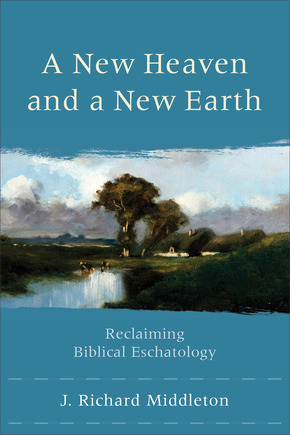A New Heaven and a New Earth
Reclaiming Biblical Eschatology
J. Richard Middleton
Grand Rapids: Baker Academic, 2014
ISBN 978-0801048685
pbk, 336pp, £14.55
Richard Middleton, the co-author of The Transforming Vision and author of The Liberating Image, has produced a fascinating, insightful and brilliant book dealing with eschatology. He wrote it because he saw that the 'time was ripe for a clearly articulated Christian eschatology that is rooted in responsible exegesis of Scripture and also attuned to the theological claims and ethical implications of the Bible's vision of salvation'. He has done exactly that. He clarifies how eschatology is consistent with a holistic worldview.
We have sadly lost the biblical vision of eschatology. For far too many Christians the aim is to escape the earth and to be in heaven with God, worshiping him - they envisage heaven as an eternal church service. For many Christians who have swallowed this escapist nonsense it will come as a shock to see that this vision of heaven is Platonic rather than biblical. It's not helped, as Middleton points out, by some of the hymns that we sing; for example: Wesley's Love Divine: 'Changed from glory into glory/ till in heaven we take our place' or even the Christmas carol 'Away in a Manger': 'And fit us for heaven to live with thee there'! As Middleton shows this idea of a transcendent non-earthy realm goes back not to the Scriptures but to Plato.
Middleton draws upon second temple Judaism, Greek philosophers, church fathers, the Apocrypha, the Dead Sea scrolls, Little Red Riding Hood, Reggae music, the film the Princess Bride, Narnia as well as primarily the scriptures to show how this holistic view of eschatology is firmly rooted in the scriptures. When it comes to a biblical view of heaven it seems we have lost the plot, but Middleton by looking at the plot of the biblical story shows us what a more biblical, holistic and integrated eschatology looks like.
In his examination of four key NT texts (Acts 3:17-21; Eph 1:7-10; Col 1:16-20; Rom 8:19-23; 2 Pet 3:10-13) he concludes that salvation is restorative and comprehensive and holistic. It is a repairing of what went wrong and a redeeming of all things - not just our 'souls'. The garden in Genesis 1 is to be fulfilled in Revelation 21-22. He rightly emphasises that 'the human contribution to the the new Jerusalem is not to be downplayed' and that salvation 'does not erase cultural differences'. Heaven is not just an eternal church service or worship meeting! He suggests that cultural development may even need to take place on the new earth.
Not being afraid of look at the apparently contrary data in scriptures, Middleton examines these in close detail. Several texts suggest a cosmic destruction and other-worldly destiny rather than an holistic renewal - these include the Olivet Discourse, Revelation 6, 2 Peter 3 and Hebrews 12. After a close examination of these passages he concludes 'the Bible envisages nothing less than the eschatological transformation of heaven and earth'; a transformation not an annihilation.
He briefly looks at personal eschatology and concludes that there is little evidence for an intermediate state in the Scriptures.
The final chapters examine the important question 'So What?' The gospel of the kingdom is good news as it addresses Jesus' hearers with 'full-bodied concrete earthly needs', and it breaks down the opposition between the Jews and gentiles; it is open to the outcasts and outsiders. This perspective is in stark contrast to the new form of dualism Middleton claims is making inroads into the North American church: an in group/ out group dualism.
He makes an excellent case for the need not to separate eschatology and ethics. The kingdom of God is not the church, or a set of cultural ideas, it is nothing less than 'God's restorative rule over the entire earth'.
The book is extremely well documented - about 25% of it is references and this shows the depth of research Middelton has done and engaged with.
This book is a must-read for all Christians.
Contents
Preface: How I Came to Write This Book
1. Introduction: The Problem of Otherworldly Hope
Part 1: From Creation to Eschaton
2. Why Are We Here? Being Human as Sacred Calling
3. The Plot of the Biblical Story
Part 2: Holistic Salvation in the Old Testament
4. The Exodus as Paradigm of Salvation
5. Earthly Flourishing in Law, Wisdom, and Prophecy
6. The Coming of God in Judgment and Salvation
Part 3: The New Testament's Vision of Cosmic Renewal
7. Resurrection and the Restoration of Rule
8. The Redemption of All Things
Part 4: Problem Texts for Holistic Eschatology
9. Cosmic Destruction at Christ's Return?
10. The Role of Heaven in Biblical Eschatology
Part 5: The Ethics of the Kingdom
11. The Good News at Nazareth
12. The Challenge of the Kingdom
Appendix: Whatever Happened to the New Earth?
Index







